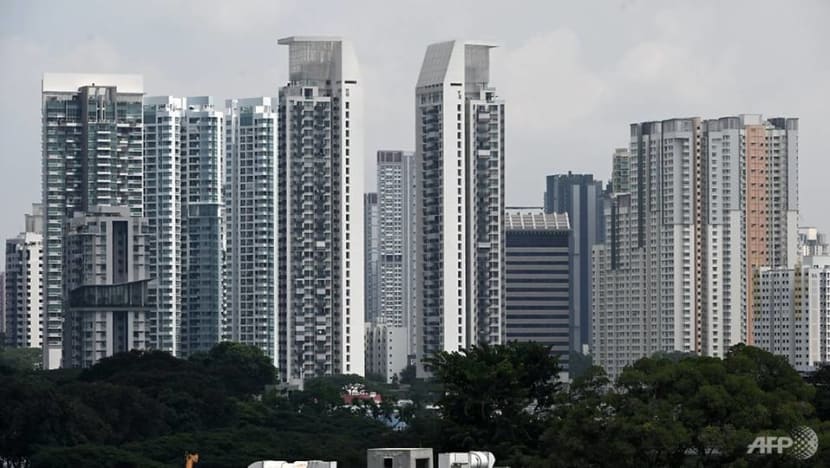Singapore private home prices rise at slower pace of 0.7% in Q1 after cooling measures

File photo of apartment buildings in Singapore. (Photo: AFP/Roslan Rahman)
SINGAPORE: Private home prices in Singapore rose 0.7 per cent in the first quarter, slightly above flash estimates released earlier this month, but down from the 5 per cent increase in the previous quarter, due to cooling measures.
The private residential property price index increased to 174.8 points in the first quarter, up from 173.6 points in the previous quarter on the back of landed properties, according to real estate statistics released by the Urban Redevelopment Authority (URA) on Friday (Apr 22).
Prices were bolstered by landed homes for which prices increased by 4.2 per cent, compared with the 3.9 per cent increase in the previous quarter.
On the other hand, prices of non-landed properties went down by 0.3 per cent, a sharp reversal from the 5.3 per cent rise in the fourth quarter of 2021.
In the Core Central Region (CCR), prices of non-landed properties decreased by 0.1 per cent in the first quarter, compared with the 2.7 per cent increase in the previous quarter.
Prices of non-landed homes in the Rest of Central Region (RCR) dropped by 2.7 per cent, pulling back from the 6.7 per cent jump in Q4 2021. Meanwhile, the prices in the Outside Central Region (OCR) rose by 2.2 per cent, compared with the 5.7 per cent increase in the previous quarter.
Analysts attributed the slowdown to the cooling measures that were introduced last December and macroeconomic uncertainties.
Despite this, "undercurrents of owner-occupier homebuyer and upgrader demand remain strong should buyers be able to find suitable homes," said Mr Leonard Tay, head of research at Knight Frank Singapore.
RENTALS
Rentals of private homes rose by 4.2 per cent in the first quarter from the 2.6 per cent increase in the previous quarter.
This was driven by both the landed and non-landed properties segment. Rentals of landed homes increased by 5.3 per cent in Q1 2022 compared with the 1.2 per cent increase in the previous quarter, while rental of non-landed properties jumped by 4.1 per cent from 2.7 per cent in Q4 2021.
A shrinking rental stock and a lack of new home supply drove rents up, said Ms Christine Sun, senior vice president of research and analytics at OrangeTee & Tie.
Future homebuyers who were priced out of the market or affected by the cooling measures turned to the rental market, boosting rental demand and pushing rents higher, Ms Sun added.
Knight Frank's Mr Tay predicted that for the whole of 2022, overall rents in the private home market could increase about 7 per cent to 9 per cent.
LAUNCHES AND TAKEUP
In the first quarter of 2022, developers launched 613 uncompleted private residential units excluding executive condominiums (ECs), a significant drop from the 2,275 units in the previous quarter. They sold 1,825 units excluding ECs in the first quarter, compared with the 3,018 in the previous quarter.
In the executive condominium segment, developers did not launch any units for sale in the first quarter but sold 131 units. This is down from the 260 units sold in the previous quarter where EC units were also not launched.
The drop to an all-time low of 613 units in Q1 2022 was due to the lack of major project launches or mega developments that have 1,000 units and above, said Mr Mohan Sandrasegeran, research & content analyst at Ohmyhome.
This was the sharpest drop since the second quarter of 2020, when there was a total of 1,713 units sold, added Mr Mohan.
SUPPLY IN THE PIPELINE
As of the end of the first quarter, there was a total supply of 47,415 uncompleted private residential units and 5,333 EC units in the pipeline with planning approvals.
Of these, 14,087 private homes and 1,878 EC units were unsold as of the end of the first quarter.
Cost pressures may play a more significant role in determining the trajectory of future home prices in the coming months, with inflation and a higher cost of living causing home prices to rise further, said Ms Sun.
“Therefore, the market could shift from a 'demand-driven' price increase to a 'cost-driven' price increase,” she added.
Supply chain issues as well as a rise in energy, steel, raw material and shipping costs due to the Russia-Ukraine war and political sanctions may drive construction costs higher, Ms Sun said.
“Climbing land prices and wage rises may further affect the bottom line of companies. Some sellers may pass the additional costs to consumers, leading to higher home prices in the coming months,” she added.
“To combat rising inflation, interest rates will be raised a few times this year. While higher mortgage rates may test the affordability threshold of some buyers, others may rush into the market to lock in home loans before they climb higher,” said Ms Sun.
















